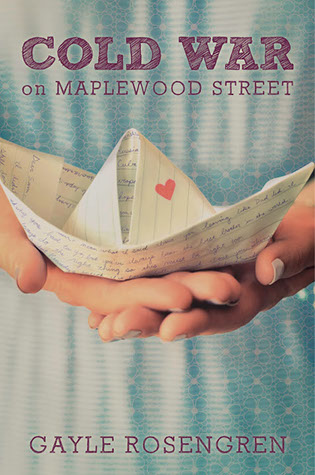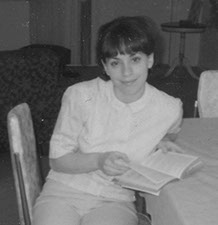Last year I read and reviewed What The Moon Said, a really cool MG historical set during the depression. Well, Gayle is back with another historical MG novel that I'm super excited about! Check out this the book and our interview with this up and coming MG author, Gayle Rosengren!
Cold War on Mapplewood Street
It's been a few months
since her adored brother Sam joined the navy, but Joanna still misses
him desperately. Sam broke his promise that he wouldn't leave her, like
their father did, so she can't help feeling hurt and betrayed and she
refuses to answer his letters. But then President Kennedy appears on TV
to announce that the Russians are bringing nuclear weapons to Cuba.
That's a direct threat to the United States! He insists that the
Russians remove the weapons at once, and he sends ships to the area to
stop Russian ships from bringing more weapons in. What if Sam's ship is one of them?
Joanna is frightened, and she's not the only one. Parents, teachers, newscasters and people in countries around the world are scared, too. How Joanna learns to live with hope in the face of fear is at the heart of this story about what it means to grow up in a world full of uncertainty, both then and now.
Why did you choose to write historical MG?
It's not so much that I chose to write
historical fiction; it just happens that these were the first two stories I
felt compelled to write. What the Moon Said was inspired by some events
in my mother's childhood and Cold War on
Maplewood Street stemmed from a major event in mine. The story I'm currently working on is
contemporary, and it's likely that will be the case for most of the stories
that follow it. I'm not committed to
time periods, only to the stories I feel are important to tell.
What is your favorite thing about writing Middle Grade?
My favorite thing is knowing how much young
readers take books to heart-- knowing that if they love my book today, they
will probably still remember it fondly many years from now. Middle grade books can make an impact that is
uniquely personal because they're the
first books youngsters read on their own. They are also the books that usually
start children down the road to being life-long readers, and that's something
very special to be a part of.
What was your inspiration
for writing?
When I was a girl, my family had very little money, which meant
opportunities for entertainment were severely limited. But thanks to libraries I always had books.
They became an enormous part of my world.
I lost myself in them for hours every day. Through reading I was whisked away to
different places and different times and I made countless book character
"friends." I liked some of them so much that it could be difficult to
read the last page, knowing my time with them was coming to an end. (Thank goodness I could flip back to the
beginning and start all over again if I wanted to, and I often did!) It was reading these books that fired my dream
of someday writing books that would mean
as much to future young readers.
What scene was really hard
for you to write and why, and is that the one of which you are most proud? Or
is there another scene you particularly love?
The most challenging scene to write was the dinner scene with the
Watermans. There were a lot of characters
interacting around the table, and there were several undercurrents that I
wanted to establish. But since everything was being seen through Joanna's eyes
I had to be careful not to make her too "knowing." She had to see things without necessarily
understanding all of what she was seeing--like the angry expression on uncle
Zack's face, and Mrs. Waterman's tears as she flings her slice of cake into the
garbage.
My favorite scene to write, though, was the one where Joanna turns her
closet into a bomb shelter. It was fun
deciding what she'd put in it. It was also a transformative scene that shows Joanna finally taking action, on
her own, to feel safer.
What do you hope readers
will take away from your book?
I hope they will see the importance of speaking up, communicating their
feelings, especially when they're afraid or worried--just as Joanna eventually
confides in her teacher and her mom and Sam.
Sharing our worries nearly always helps us to feel better..
What's your writing ritual
like? Do you listen to music? Work at home or at a coffee shop or the library,
etc?
I like to write on my laptop at my desk off the kitchen, with the coffee
pot just a few steps away, my dog Fiona dozing at my feet, and my husband Don
working at his own laptop nearby. It's
the coziest writing situation ever--quiet, and full of love and positive
energy.
What advice would you most
like to pass along to other writers?
If writing is your dream, you must go for it with everything in you and
never give up. It took me a long time to
be published. I joke that I'm the poster
child for perseverance. But that's what it takes. Only a few people find success quickly. For the rest of us it's a bit of an endurance
test. My best advice is to join a
critique group of four or five other writers so you can help support each other
and improve each other's writing. Having
a good critique group is probably the single most valuable part of a successful
writing journey. I know I couldn't have
hung in there without mine.
What are you working on now?
I recently
completed a contemporary novel about loyalty that has elements of mystery and
suspense. It's Middle Grade, of course!
I can't wait to get my hands on this book!
About the author!
Gayle at age 16
Gayle grew up in Chicago. Like her main characters, Esther and Joanna, she enjoyed school, was an avid reader, and loved dogs and horses. She majored in creative writing and philosophy in college and was the editor of the literary magazine
Gayle never outgrew her passion for children's books, though, and she worked in the children's and young adult departments of a public library in Illinois for several years, enthusiastically sharing her love of books with young people while raising three young readers of her own.
Gayle eventually moved to Wisconsin, where she worked first in
the reference library, and later as a copyeditor, at The Pleasant
Company, where the American Girl books were published. During this time
she published short stories for children in Cricket, Ladybug, Jack and Jill and Children's Digest magazines.



No comments:
Post a Comment